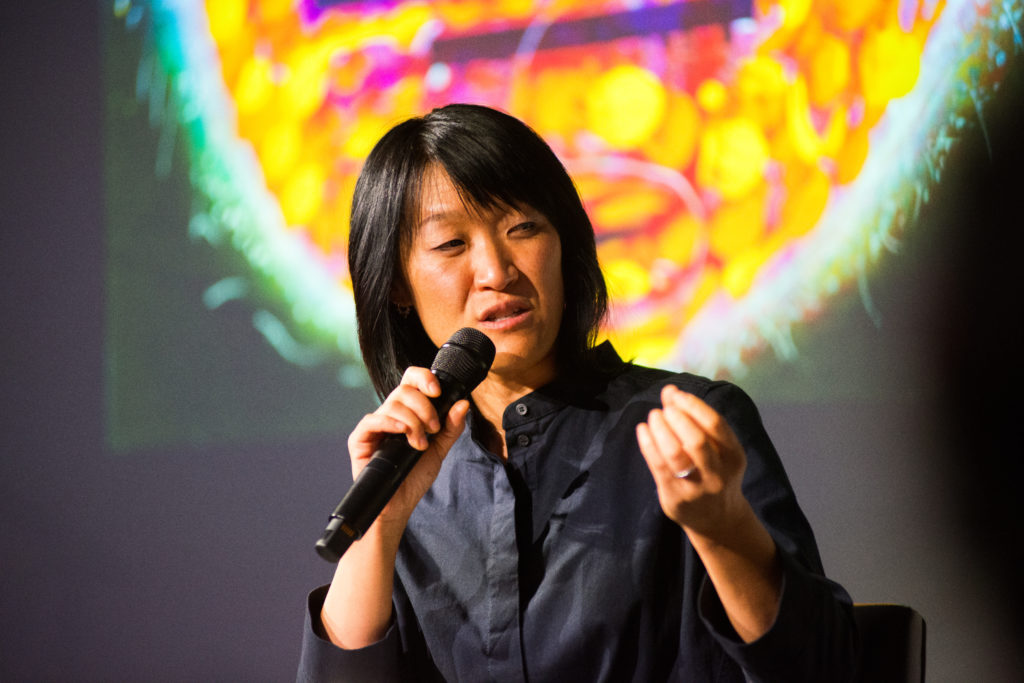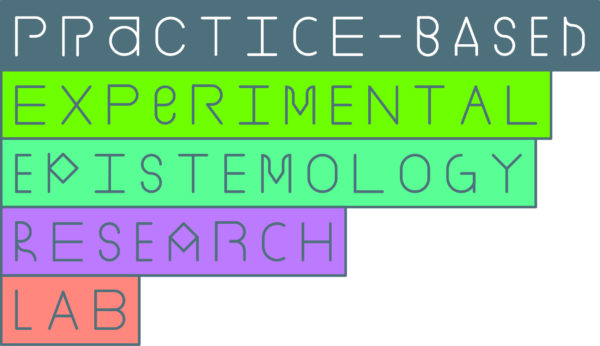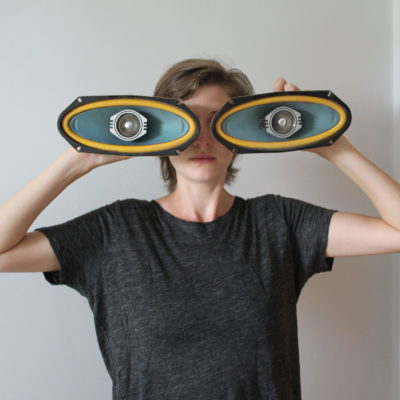The Power of Listening to Voices: An Interview with Nina Sun Eidsheim
May 18, 2021
Klara du Plessis


On Thursday, May 20th, 130-3pm EDT, Nina Sun Eidsheim will deliver a keynote address as part of the 2021 Listening, Sound, Agency symposium. Titled “Re-writing Algorithms for Just Recognition: From Digital Aural Redlining to Accent Activism,” she will argue that “voice- and listening technologies carry and reproduce the same social bias, discrimination, and racism […] as Kodak film and HP cameras [which] were calibrated for white skin colour.” Elaborating on this important research, Nina generously answered some questions about her current projects and interests, providing poignant backstory to her keynote, and inviting all readers to events at her UCLA PEER Lab in the next weeks and months.
*
The SpokenWeb team is thrilled and honoured to have you as a plenary speaker at this year’s symposium! Would you like to share a teaser, perhaps one aspect of your forthcoming talk that excites you? A sound, an image, an argument, a fact?
For twenty years, my work has been dedicated to questions of race and voice, focusing on vocal timbre. Last year, I was asked to contribute a chapter on accent to an edited volume (Thinking with an Accent, co-edited by Pooja Rangan, Akshya Saxena, Ragini Tharoor Srinivasan, and Pavitra Sundar). When sitting down to write, I thought I didn’t have much to say on the topic. However, one evening my family and I were playing a special version of Monopoly with “voice banking”—a digital “banker” who hears players speak transactions like “buy Main Street”—each family member with their own distinct accented English. The person with what might colloquially be referred to as the “strongest” accent, lost massively. The person with the American English accent won the game by far. Our communication with this “digital banker” illuminated the intricacies, challenges and power dynamics of performing with and listening to accents. I was unprepared for our family game night becoming an illustration of the very dynamics I study: the ways in which power is wielded by listening to voices. This scene of a family playing a game of Monopoly with one big winner and two obvious losers encapsulates the concerns of the talk: the economic impact of listening practices and aural representations of voices in the acoustic, analogue, and digital realms.
At SpokenWeb we sometimes conceptualize listening as active, a form of doing or making. When I read parts of your recent book, The Race of Sound, I was struck by your point that the source of sound is not in the speaker (in terms of human interactions), but in the listener. You write, “I could flip the directionality of the speech chain, calling it the listener-voice chain, with the listener as the focal point” and, as a result, you later suggest that listening is a political act. I realize that I am asking an impossibly large question (input your entire book!), but it would be great to hear you speak about self-conscious, subjective listening as an act of making.
All the vocalists I spend time researching and writing about have presented a listening dilemma. Those dilemmas are what have led me to understand not only voices, but how a sonic image of these voices are formed within the listener. That sonic image oftentimes has more to do with the stories told, or stereotypes about certain people and how that is manifested through voice than about the sonority of these voices themselves. (And this is even more complicated when vocalizers also apply such a listening process to themselves.) This gap between what the listener perceives and the sounded voice points toward the socio-cultural construction of listening. And, the formation of the sonority of the voices themselves is the result of the everyday pressures, unequally applied. It is very difficult, if not impossible, to listen outside those filters and vocalize without sounding racialized and gendered structures.
SpokenWeb researchers often engage with the sounding of literature. How could you imagine your research on race, sound, and listening being applied to the study of poetry in performance, for instance?
I imagine that poetry in performance is not much unlike singing in performance. Both practices have spoken and unspoken rules; and both have listening communities that uphold, challenge, and shift those conventions. So, to me, the same theoretical and analytical framework can be applied. In short, the way we vocalise is the result of a performative practice (even if it is just the way we speak daily). Those performative practices are shaped by structural power dynamics: People are allowed or not allowed to vocalize in certain ways and are also heard according to these rules. I have been particularly concerned with how race, and to some extent, gender, are elements people care about when it comes to vocal expression.
That said, my colleague Marit J. Macarthur (UC Davis) who works on some large collaborative projects on spoken word poetry is using some of my framework to understand tacit and explicit expectations of Black poets performances—such as Tracy K. Smith, Natasha Trethewey, Jae Nichelle and Mahogany L. Browne—of their own poetry.
Less formally, your book engages with the music of Billie Holiday, Jimmy Scott, among others. Could you shed some light on your personal relationship towards these musicians’ oeuvres? Apart from your research, what attracts you to vocal music?
The voices I’ve studied and written about move the world. Listening to them, it feels like my very molecular structure is transformed. Each of the voices I’ve written about has shaken me to the core—not necessarily because of their beauty or virtuosity, but because of their power. I seldom really hear the words sung, but rather the shape and material impact of their energy.

PEER Lab Logo
Finally, I know you recently launched the UCLA PEER (Practice-Based Experimental Epistemology Research) Lab and I’m wondering whether you’d like to briefly introduce it to our readers?
I founded the Practice-based Experimental Epistemology Research Lab, or, PEER Lab, at UCLA, in the summer of 2020. We’ve spent the past year working quietly at our kitchen tables and in our backyards. We’re still in an experimental phase working in different modules, including research groups that we welcome you to join. (See research groups and sign up link here.) Across all our projects, we pay attention to how oppressed groups and individuals survive, pursue knowledge, and express joy through music and sound, and in doing so the Lab seeks to understand what it is to be human.
The Lab’s theoretical foundation draws its lineage from practice-based research (among other names for this type of research). But this type of inquiry is of course simply how humans have always investigated, interacted—indeed collaborated—with the material and spiritual world. To this end, we’re concerned about the ways certain types of knowledge practices are legitimized while others are delegitimized by academia. Moreover, we find the way creative practices are divided into different fields limiting both practice and inquiry. We attempt to find creative antidotes to these restrictions by bringing artists and thinkers into unexpected connections with the goal of protecting intimate, non-goal oriented dialogue that may lead to the incubation of new thoughts, ideas, and concepts. You can learn more about our approach in this brief video.
This spring we started hosting public events, which we welcome everyone to join. On Thursday, May 27, my dear friend, the pianist and composer Vijay Iyer will co-host with me a conversation about authors Daphne Brooks, Farah Griffin, and Gayle Wald’s soundtrack to their creativity. Register here. And, if you want to spend more time writing and reflecting with us, please attend our Thursday, June 24, 10am PST workshop, during which we will consider the multisensorial aspect of music. Register here.
*
Nina Sun Eidsheim studied vocal performance, composition, and philosophy at the University of Agder (Norway) and The Royal Academy of Music, Aarhus (Denmark) before pursuing an MFA in Music at the California Institute of the Arts. She completed her Ph.D. in critical studies/experimental practices program at the University of California, San Diego. Eidsheim is the author of Sensing Sound: Singing and Listening as Vibrational Practice (Duke, 2015) and The Race of Sound: the Micropolitics of Listening to Vocal Timbre and Vocality in African-American Popular Music (Duke, 2019). She is Professor of Musicology at the Herb Alpert school of Music, UCLA, where she has just launched the PEER (Practice-Based Experimental Epistemology Research) Lab, an experimental research lab dedicated to decolonizing data, methodology, and analysis through creative practice.
This article is published as part of the Listening, Sound, Agency Forum which presents profiles, interviews, and other materials featuring the research and interests of future participants in the 2021 SpokenWeb symposium. This series of articles provides a space for dialogical and multimedia exchange on topics from the fields of literature and sound studies, and serves as a prelude to the live conference.
